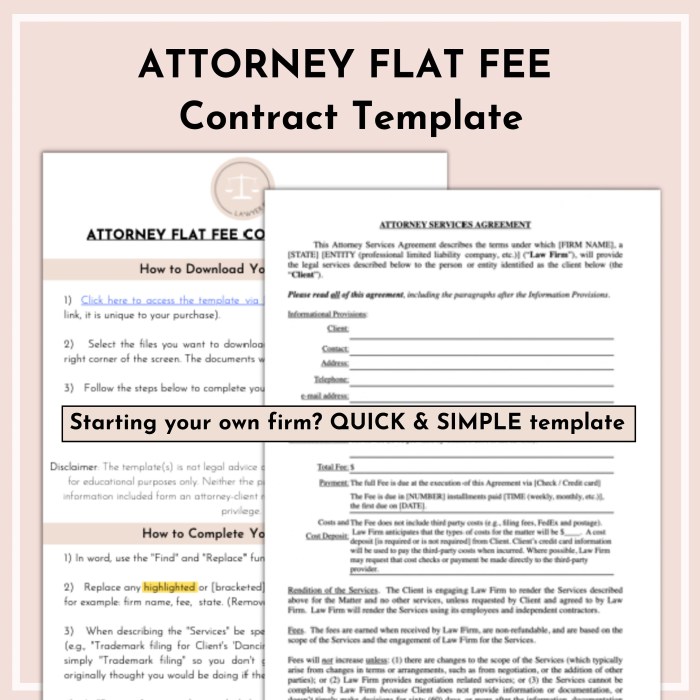Attorney fees for simple wills can vary depending on several factors, including the complexity of the will, the experience of the attorney, and the location of the attorney’s office. This guide will provide you with an overview of the average cost range for attorney fees related to simple wills and offer tips on how to save money on these fees.
When it comes to estate planning, it’s important to understand the potential costs involved. Attorney fees can be a significant expense, but they are also an essential part of ensuring that your wishes are carried out after you pass away.
This guide will help you understand the factors that affect attorney fees for simple wills and provide you with tips on how to negotiate the best possible rate.
Legal Fees Associated with Simple Wills
Attorney fees for simple wills can vary depending on a number of factors, including the complexity of the will, the location of the attorney, and the experience of the attorney.
In general, however, you can expect to pay between $100 and $500 for a simple will.
Factors that Influence Attorney Fees for Simple Wills
- The complexity of the will: A more complex will will require more time and effort to draft, which will result in higher attorney fees.
- The location of the attorney: Attorneys in large cities typically charge more than attorneys in small towns.
- The experience of the attorney: Attorneys with more experience typically charge more than attorneys with less experience.
Tips on How to Save Money on Attorney Fees for Simple Wills
- Get quotes from several attorneys before hiring one.
- Negotiate the attorney’s fees before hiring them.
- Consider using a legal document preparation service.
| Complexity of Will | Average Cost Range |
|---|---|
| Simple Will | $100-$500 |
| Complex Will | $500-$1,500 |
Hourly Rates for Attorneys

The hourly rates charged by attorneys for preparing simple wills can vary significantly depending on their experience and location. Generally, attorneys with more experience and those practicing in larger cities tend to charge higher hourly rates. It’s important to obtain quotes from multiple attorneys before making a decision to ensure you’re getting a fair price.
Factors Affecting Hourly Rates
- Experience:Attorneys with more experience typically charge higher hourly rates due to their increased knowledge and expertise.
- Location:Attorneys practicing in larger cities, where the cost of living is higher, generally charge higher hourly rates than those in smaller towns.
- Reputation:Attorneys with a strong reputation for providing high-quality legal services may charge higher hourly rates than those with less experience or a less established reputation.
- Complexity of the Will:The complexity of the will can also affect the hourly rate charged by an attorney. Simple wills with straightforward instructions will typically cost less than more complex wills that require additional research and drafting.
Flat Fees for Simple Wills
Flat fee arrangements for simple wills offer several advantages. They provide certainty regarding the cost of the legal services, making it easier to budget for the expense. Flat fees also eliminate the risk of unexpected charges or hourly fees that can accumulate quickly.
This can be particularly beneficial for individuals with limited financial resources.
However, flat fee arrangements also have some disadvantages. They may not be suitable for complex wills or situations where the scope of work is unclear. Additionally, flat fees may not always reflect the actual time and effort required to prepare the will, which could result in the attorney undercharging or overcharging for their services.
Typical Flat Fee Ranges for Simple Wills
Typical flat fee ranges for simple wills vary depending on the location, the complexity of the will, and the experience of the attorney. In general, flat fees for simple wills range from $200 to $800.
Factors Affecting the Flat Fee for a Simple Will
- Complexity of the will
- Number of beneficiaries
- Value of the estate
- Location
- Experience of the attorney
Table Summarizing the Advantages and Disadvantages of Flat Fee Arrangements for Simple Wills
| Advantages | Disadvantages |
|---|---|
| Certainty of cost | May not be suitable for complex wills |
| Eliminates the risk of unexpected charges | May not reflect the actual time and effort required |
| Easier to budget for | May result in the attorney undercharging or overcharging |
Negotiating a Flat Fee for a Simple Will
To negotiate a flat fee for a simple will, it is important to be prepared. Research typical flat fee ranges for simple wills in your area. Be clear about your needs and the complexity of your will. Discuss your budget with the attorney and be willing to negotiate a fair price.
Factors Influencing Attorney Fees
The cost of attorney fees for a simple will can vary depending on several factors. Two key factors that significantly influence attorney fees are the complexity of the will and the size of the estate.
Complexity of the Will
The complexity of the will refers to the number of provisions, trusts, and other legal considerations included in the document. A simple will with straightforward instructions and no complex clauses or trusts will generally require less time and effort for the attorney to prepare, resulting in lower fees.
On the other hand, a complex will that involves multiple beneficiaries, trusts, or specific instructions for the distribution of assets will require more time and legal expertise to draft. As such, the attorney fees for a complex will are typically higher.
Size of the Estate
The size of the estate also plays a role in determining attorney fees. Attorneys may charge a percentage of the estate’s value as their fee. This is because larger estates often require more complex planning and legal considerations, such as tax implications and asset protection strategies.
For example, an estate worth $500,000 may incur attorney fees of around $1,000 to $2,000 for a simple will. However, an estate worth $5 million could result in attorney fees ranging from $5,000 to $10,000 or more.
Additional Fees to Consider

In addition to attorney fees, there may be other expenses associated with preparing a simple will. These can include probate fees, filing fees, and court costs.
Probate Fees
Probate is the legal process of administering an estate after someone dies. In most cases, probate fees are charged by the court where the will is filed. The fees can vary depending on the value of the estate and the jurisdiction.
Filing Fees
Filing fees are charged by the court for filing the will. These fees can also vary depending on the jurisdiction.
Court Costs
Court costs may be incurred if there are any disputes or challenges to the will. These costs can include fees for expert witnesses, court reporters, and other expenses.The following table provides a general overview of the typical range of additional fees for simple wills in different jurisdictions.
Please note that these fees are estimates and may vary depending on the specific circumstances of each case.
| Jurisdiction | Probate Fees | Filing Fees | Court Costs |
|---|---|---|---|
| California | $400-$600 | $50-$100 | $200-$300 |
| New York | $300-$500 | $30-$70 | $150-$250 |
| Florida | $200-$400 | $20-$50 | $100-$200 |
Negotiating Attorney Fees
Negotiating attorney fees for simple wills can be a daunting task, but it is important to remember that you are the client and you have the right to negotiate a fair price for the services you need. By being prepared, understanding your needs, and being willing to negotiate, you can get the legal help you need at a price you can afford.
Common Factors Affecting Attorney Fees
There are a number of factors that can affect attorney fees for simple wills, including:
- The complexity of the will: A more complex will will require more time and effort to draft, which will result in a higher fee.
- The experience of the attorney: More experienced attorneys typically charge higher fees than less experienced attorneys.
- The location of the attorney’s office: Attorneys in large cities typically charge higher fees than attorneys in small towns.
Average Attorney Fees for Simple Wills
The average attorney fees for simple wills vary depending on the state in which you live. According to a recent study by LegalZoom, the average attorney fees for a simple will in the United States is $350. However, fees can range from $100 to $1,000 or more, depending on the factors discussed above.
Tips for Negotiating Attorney Fees, Attorney fees for simple will
Here are a few tips for negotiating attorney fees for simple wills:
- Be prepared: Before you meet with an attorney, take some time to research the average attorney fees for simple wills in your area. This will give you a good starting point for negotiations.
- Have a clear understanding of your needs: Before you meet with an attorney, take some time to think about what you want in a will. This will help you to avoid paying for unnecessary services.
- Be willing to negotiate: Don’t be afraid to negotiate with an attorney about their fees. Most attorneys are willing to work with clients to find a fair price.
Sample Script for Negotiating Attorney Fees
Here is a sample script that you can use to negotiate attorney fees with an attorney:
“I understand that your fee for a simple will is $350. However, I am on a tight budget and I was hoping to get a lower price. Would you be willing to reduce your fee to $250?”
Avoiding Common Pitfalls
Here are a few common pitfalls to avoid when negotiating attorney fees:
- Don’t be afraid to ask questions: If you don’t understand something, don’t be afraid to ask the attorney to explain it to you.
- Don’t sign anything until you understand it: Before you sign a fee agreement, make sure you understand all of the terms and conditions.
- Don’t be afraid to walk away: If you are not comfortable with the attorney’s fees, don’t be afraid to walk away and find another attorney.
Do-It-Yourself Wills
Creating a simple will without an attorney can potentially save you hundreds of dollars in legal fees. However, it’s crucial to be aware of the risks and limitations associated with do-it-yourself wills.
Cost Savings
The most significant benefit of creating your own will is the cost savings. Attorneys typically charge an hourly rate for their services, which can add up quickly, especially if your will is complex. Do-it-yourself will kits, on the other hand, are available for a fraction of the cost, typically ranging from $20 to $100.
Risks and Limitations
While do-it-yourself wills can be a cost-effective option, they come with certain risks. If your will is not properly drafted, it may not be legally valid. This could lead to your wishes not being carried out after your death, which can have serious consequences for your loved ones.
Additionally, do-it-yourself wills may not be suitable for complex estates or situations where there are potential disputes among beneficiaries.
Online Legal Services: Attorney Fees For Simple Will

Online legal services have emerged as a convenient and affordable option for individuals seeking to create simple wills. These services leverage technology to streamline the process, making it accessible and cost-effective.
Reputable Online Legal Service Providers
Several reputable online legal service providers offer affordable will-drafting services. Some notable examples include:
- LegalZoom
- Rocket Lawyer
- Quill
- Trust & Will
- Gentreo
Free Legal Aid
Individuals who cannot afford attorney fees can access free legal aid services provided by various organizations. These services offer assistance with legal matters, ensuring equal access to justice for all.
To qualify for free legal aid, individuals must meet specific eligibility requirements, which typically include income and asset limits. Additionally, the legal issue must fall within the scope of services provided by the organization.
Organizations Providing Free Legal Aid
- Legal Aid Societies: Non-profit organizations that provide free legal representation to low-income individuals.
- Pro Bono Programs: Lawyers who volunteer their time to provide free legal services to those in need.
- Law School Clinics: Law students supervised by licensed attorneys provide legal assistance to low-income clients.
Process for Applying for Free Legal Aid
To apply for free legal aid, individuals can contact the local legal aid society or pro bono program. They will need to provide documentation of their income, assets, and the legal issue they are facing.
After reviewing the application, the organization will determine if the individual is eligible for free legal aid. If approved, the individual will be assigned an attorney who will provide legal advice and representation.
Limitations of Free Legal Aid
Free legal aid services are limited in scope and resources. They may not be able to assist with all legal matters or provide ongoing representation.
Additionally, eligibility requirements can vary depending on the organization and funding availability.
Contact Information
- National Legal Aid & Defender Association: https://www.nlada.org/
- American Bar Association Pro Bono Center: https://www.americanbar.org/groups/pro_bono/
Legal Aid Organizations
Legal aid organizations provide free or low-cost legal services to low-income individuals and families. These organizations can assist with a variety of legal issues, including estate planning.Many legal aid organizations offer assistance with simple wills. These services may include:
- Drafting a simple will
- Reviewing a will
- Providing information about estate planning
If you are unable to afford an attorney, you may be able to get help from a legal aid organization. To find a legal aid organization in your area, you can visit the website of the American Bar Association (ABA) or the National Legal Aid & Defender Association (NLADA).
– Discuss the benefits of using attorney directories to find attorneys who specialize in estate planning, such as saving time and accessing a wider pool of candidates.
Attorney directories offer a convenient and efficient way to find attorneys who specialize in estate planning. They provide a comprehensive database of lawyers, allowing you to search based on specific criteria such as location, experience, fees, and reviews.
One of the main benefits of using attorney directories is that they save you time and effort. Instead of having to contact individual law firms or rely on word-of-mouth referrals, you can browse through a directory and quickly identify attorneys who meet your requirements.
Another advantage of attorney directories is that they give you access to a wider pool of candidates. By searching through a directory, you can connect with attorneys from different firms and practice areas, increasing your chances of finding the right attorney for your needs.
How to search for attorneys using attorney directories
To search for attorneys using attorney directories, follow these steps:
- Determine your criteria: Decide on the location, experience, fees, and reviews that are important to you.
- Choose a directory: There are several reputable attorney directories available, such as Martindale-Hubbell, Avvo, and FindLaw.
- Enter your search parameters: Use the directory’s search filters to specify your criteria and narrow down your results.
- Review attorney profiles: Take the time to read attorney profiles carefully and pay attention to their experience, fees, and reviews.
Examples of popular attorney directories
Some popular attorney directories include:
- Martindale-Hubbell: A comprehensive directory that provides detailed profiles of attorneys, including their experience, fees, and reviews.
- Avvo: A user-friendly directory that allows you to search for attorneys by location, practice area, and fees. It also features attorney ratings and reviews.
- FindLaw: A well-established directory that offers a wide range of legal resources, including attorney profiles, articles, and legal forms.
Tips for evaluating attorney profiles
When evaluating attorney profiles, consider the following factors:
- Experience: Look for attorneys who have experience in estate planning and who have handled cases similar to yours.
- Fees: Determine if the attorney’s fees are within your budget and if they offer payment plans or flat fees.
- Reviews: Read reviews from past clients to get an idea of the attorney’s communication skills, responsiveness, and overall service.
Limitations of using attorney directories
While attorney directories can be a valuable resource, they do have some limitations:
- Lack of personal recommendations: Attorney directories do not provide personal recommendations or insights into the attorney’s personality or work style.
- Need to pay for premium services: Some directories offer premium services, such as access to more detailed attorney profiles or the ability to contact attorneys directly, which may require a subscription fee.
Using attorney directories in conjunction with other methods
To maximize your chances of finding the right estate planning attorney, use attorney directories in conjunction with other methods, such as:
- Referrals: Ask friends, family, or other professionals for recommendations.
- Online reviews: Read reviews on platforms like Google My Business or Yelp to get insights from past clients.
– Explain how to obtain attorney referrals from trusted sources, such as friends, family, or financial advisors.
Referrals from trusted sources are valuable when seeking an attorney. Friends, family, or financial advisors who have had positive experiences with attorneys can provide reliable recommendations.
Obtaining Referrals
- Ask for Referrals:Reach out to trusted individuals and inquire if they have any recommendations for attorneys specializing in estate planning.
- Describe Your Needs:Clearly articulate your specific legal needs to ensure the referred attorney aligns with your requirements.
- Gather Information:Collect details about the attorney’s experience, fees, and availability to make an informed decision.
Sample Attorney Fee Agreement

An attorney fee agreement for a simple will Artikels the terms of the legal services to be provided, including the fees and expenses associated with the preparation of the will. It is important to review the agreement carefully before signing to ensure that you understand the terms and conditions.
Key provisions to look for in an attorney fee agreement include:
Scope of Services
- Description of the legal services to be provided, including the preparation of the will and any other related services.
Fees
- Amount of the attorney fees, whether they are flat fees or hourly rates.
- Method of payment, such as a retainer or payment upon completion of the services.
Expenses
- Reimbursement for expenses incurred by the attorney in connection with the preparation of the will, such as court filing fees or travel expenses.
Termination
- Conditions under which the agreement can be terminated, such as if the client fails to pay the fees or if the attorney is unable to complete the services.
Governing Law
- The state or jurisdiction whose laws will govern the agreement.
Conclusion
In conclusion, understanding attorney fees for simple wills is crucial before hiring an attorney. By considering the factors discussed, you can make an informed decision that aligns with your needs and budget. Remember that the complexity of your estate, the experience of the attorney, and the location can all impact the cost of legal services.
Do not hesitate to negotiate fees, seek referrals, or explore alternative options like online legal services or free legal aid if necessary. By being proactive and informed, you can ensure that you receive quality legal representation at a reasonable cost.
Conclusive Thoughts
By following the tips in this guide, you can save money on attorney fees for a simple will without sacrificing quality. Remember to shop around for the best rate, negotiate your fees, and consider using online legal services or do-it-yourself options if you are on a tight budget.
With a little planning, you can ensure that your final wishes are carried out without breaking the bank.
FAQ Summary
What is the average cost of an attorney fee for a simple will?
The average cost of an attorney fee for a simple will ranges from $300 to $1,000. However, this cost can vary depending on the factors discussed in this guide.
How can I save money on attorney fees for a simple will?
There are several ways to save money on attorney fees for a simple will, including shopping around for the best rate, negotiating your fees, and considering using online legal services or do-it-yourself options.
What should I look for when choosing an attorney to draft my simple will?
When choosing an attorney to draft your simple will, you should consider their experience, fees, and location. You should also make sure that you feel comfortable with the attorney and that you understand their fees.